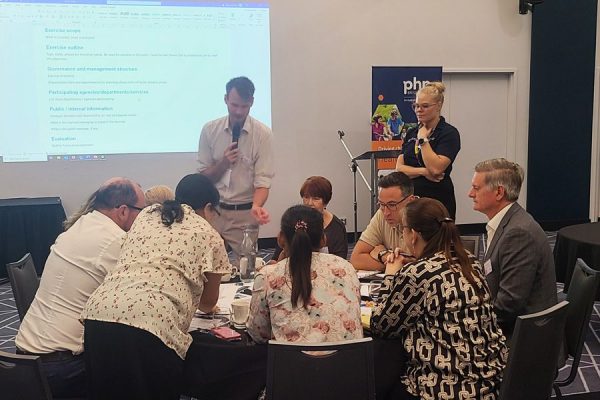Metro North building health sector disaster resilience

Dr Tom Boosey, EMBC Senior Registrar, and EMBC Nurse Manager Denise Johnson facilitating an exercise management discussion exercise at a PHN Collaborative Forum
In a large organisation like Metro North, any significant disruption to our ability to provide care is considered an incident. These incidents are mitigated and managed by business continuity planning.
Metro North’s Emergency Management and Business Continuity (EMBC) team is involved in all phases of disaster response and emergency management within Metro North, including preparedness (planning, training), response, post-incident recovery and lessons management. Incidents can range from major events like the COVID-19 pandemic response, to flooding, IT outages, surges in bed demand, and even a high number of staff on sick leave.
EMBC Director Di Bretherton says since the pandemic, EMBC in partnership with other Metro North teams, including Metro North Public Health, RADAR and OPEN, has been working closely with residential aged care homes (RACHs) to build resilience in the community and assist with planning, as part of the local disaster management committee led by Queensland Police.
“Last year because of the predicted high bushfire risk, we collaborated with the PHNs in our region to present at their collaborative forums aimed at residential aged care home managers and clinical leaders,” Di said.
“We spoke to RACHs about business continuity planning and evacuation planning in the event of a bushfire and did a roadshow to 18 RACHs in Moreton Bay and Brisbane area with our partners on the local disaster management groups to support hazard and risk awareness and to share key resources and tools to support planning.
“The engagement was really positive, and the approach taken by Metro North has now been adopted by others across the state.”
The team was also invited to run two workshops in March to help RACHs validate their plans through exercising and introduced them to the EMERGO Train System as a tool that can be used to simulate real time response.
In May, the Metro North EMBC team presented at an aged care providers conference on the Gold Coast, attended by 460 participants.
“We recognise that our role in the sector includes encouraging resilience and offering assistance to support disaster management preparedness,” Di said.
“It’s been a great experience to be able to support our health sector colleagues and build our relationships with disaster management in mind.
“All the different parts of the health sector work together during a disaster response and working together helps us to better support our patients, clients, staff and the community during disaster events and helps ensure we maintain continuity in our services.
“It was fantastic to have the opportunity to be invited to speak at the conference and showcase the work we’ve been doing in Metro North with RACHs and our partners.”
Di said there were lessons learnt from the COVID response that continue to inform decisions today.
“A lot of planning refined during COVID can be adapted for outbreak planning for other seasonal events such as flu. Whether it’s COVID, flu, or floods, an all-hazards approach to planning is the standard in disaster management in Queensland,” she said.
“The networks and partnerships we built during the pandemic are still strong. We have been able to support GPs, through the PHN, and RACHs during recent bad weather events.”
As part of the broader local and district disaster management arrangements, Metro North has provided health assistance in other incidents, such as supplying medication to isolated people during flooding.
The Metro North EMBC team comprises five people. They work closely with emergency management coordinators who support Metro North’s clinical directorates to develop, test and implement a range of localised disaster, emergency and business continuity plans and are responsible for activating and maintaining the Metro North Health Emergency Operations Centre.
“There is always an opportunity to improve, but the fact that most of the time when we are activated, the public and our patients don’t see the difference, means our disaster and business continuity arrangements are working, which is a testament to the efforts and dedication of all staff to provide continuity of care to our patients,” Di said.
